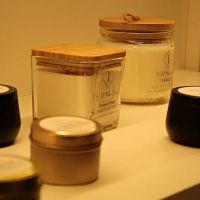Do Scented Candles Have an Impact on the Skin?
- How Scented Candles Affect Air Quality
- Can Scented Candles Cause Skin Irritation?
- Types of Wax and Their Effects on Skin
- Essential Oils vs. Synthetic Fragrances: Which is Better for Your Skin?
- Best Scented Candles for Sensitive Skin
- Tips for Choosing Skin-Friendly Candles
- Find the Best Skin-Safe Scented Candles
How Scented Candles Affect Air Quality
Scented candles create a relaxing atmosphere, but their impact on air quality can influence skin health. Burning candles releases particles into the air, which can include soot, volatile organic compounds (VOCs), and fragrance chemicals.
Some candles, especially those made from paraffin wax, release tiny soot particles that can settle on the skin and cause irritation, particularly for people with sensitive or acne-prone skin. Choosing cleaner-burning alternatives like soy, beeswax, or coconut wax can help reduce potential skin irritation caused by airborne particles.
Can Scented Candles Cause Skin Irritation?
For most people, scented candles are harmless, but for those with sensitive skin, they may trigger reactions. Skin irritation from candles can occur due to:
- Fragrance Allergies: Some artificial scents contain allergens that can cause redness or itching when they come into contact with the skin.
- Soot Buildup: Poorly burning candles release soot, which can clog pores and contribute to breakouts.
- Essential Oils: While natural, some essential oils (like cinnamon or citrus oils) can be irritating to the skin in high concentrations.
If you notice irritation after using scented candles, consider switching to ones made with natural ingredients and free from synthetic additives.
id="types-of-wax-and-their-effects-on-skin">Types of Wax and Their Effects on Skin
The type of wax used in a candle can impact not only air quality but also its potential effects on your skin. Here’s a breakdown of common candle waxes:
- Paraffin Wax: A petroleum byproduct that can release soot and VOCs, which may irritate sensitive skin.
- Soy Wax: A natural alternative that burns cleaner and produces less soot, reducing potential skin irritation.
- Beeswax: Known for its air-purifying properties, beeswax candles are hypoallergenic and ideal for those with skin sensitivities.
- Coconut Wax: A sustainable and clean-burning option that minimizes airborne irritants.
For skin-friendly choices, opt for candles made with soy, beeswax, or coconut wax.
Essential Oils vs. Synthetic Fragrances: Which is Better for Your Skin?
The fragrance in scented candles comes from either natural essential oils or synthetic fragrances. Each has its pros and cons:
- Essential Oils: Derived from plants, essential oils offer natural benefits, but some can be strong irritants for sensitive skin.
- Synthetic Fragrances: These provide long-lasting scents but often contain chemicals that can trigger allergic reactions.
If you have sensitive skin, look for candles labeled as "phthalate-free" or made with pure essential oils in low concentrations.
Best Scented Candles for Sensitive Skin
If you're looking for skin-friendly scented candles, consider these options:
- Scent Snob Lavender & Chamomile Candle: Made with soy wax and infused with gentle essential oils, perfect for relaxation.
- Beeswax & Honey Candle: A natural, hypoallergenic option that purifies the air while offering a mild scent.
- Coconut Wax Vanilla & Almond Candle: Free from synthetic fragrances, this candle provides a warm, comforting aroma.
- Rose & Geranium Essential Oil Candle: A soft floral scent that is less likely to irritate sensitive skin.
Tips for Choosing Skin-Friendly Candles
To minimize skin irritation from scented candles, follow these tips:
- Choose Clean-Burning Wax: Opt for soy, beeswax, or coconut wax to reduce airborne irritants.
- Check the Ingredients: Look for phthalate-free, paraben-free, and toxin-free candles.
- Burn Candles in a Well-Ventilated Area: This helps prevent excessive exposure to airborne particles.
- Trim the Wick: Keeping the wick trimmed to ¼ inch reduces soot and improves air quality.
- Test Before Prolonged Exposure: If you're unsure, try burning a candle for a short time to see how your skin reacts.
Find the Best Skin-Safe Scented Candles
While scented candles can impact the skin, choosing high-quality, natural alternatives can reduce risks and enhance your home’s ambiance without irritation.
For premium, skin-safe scented candles, visit Scent Snob. Their carefully curated collection offers natural, non-toxic candles designed for a clean, soothing experience.



0 comments